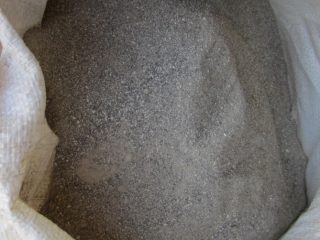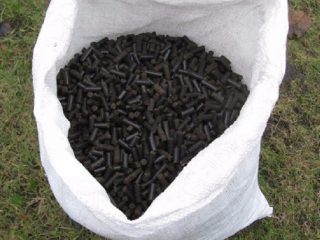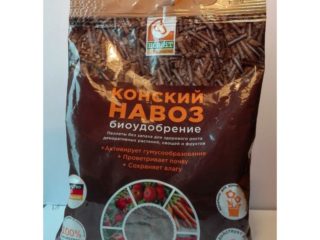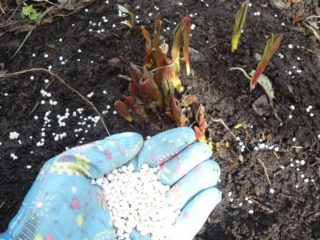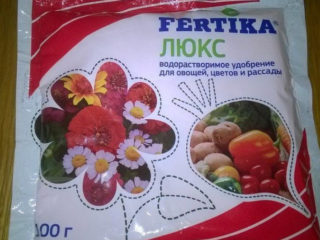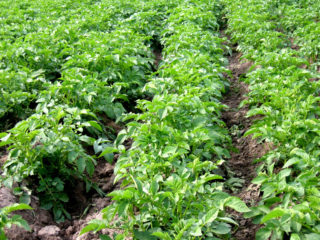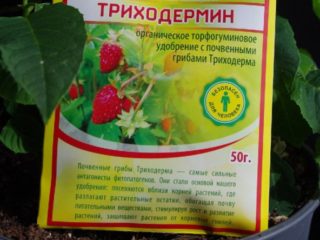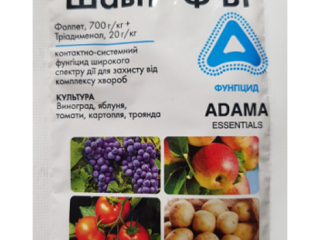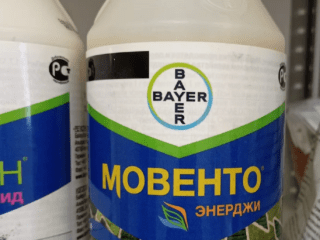Content
With the onset of the growing season, gardens and vegetable gardens become the target of pest attacks. To combat them, the insecticide Fastak was developed - a chemical preparation characterized by an instant effect and a wide area of effect.
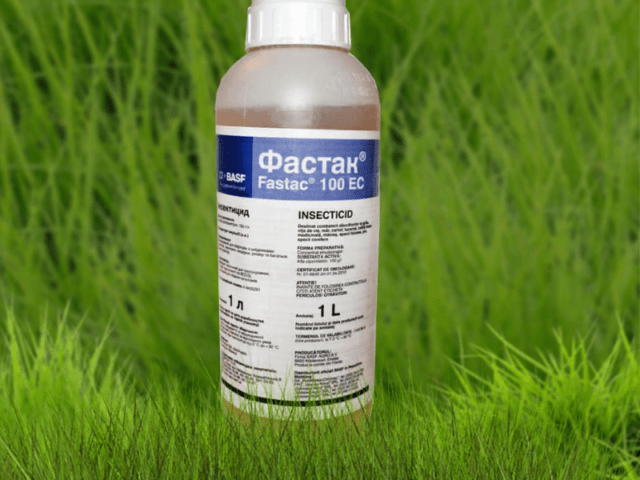
Insecticide Fastak will help you forget about pests for a long time
Purpose and scope
Fastak KE is a fast-acting insecticidal preparation of chemical origin, which is intended to control pests of fruit and berry and grain crops.
This insecticide is used in the process of carrying out field and gardening work against harmful insects of fruit trees and shrubs, as well as crops of grain crops.
Treating cultivated plants with Fastak helps get rid of a whole range of pests: gnawing and sucking insects:
- onion, carrot and beet flies;
- aphids and thrips;
- bedbugs and fleas;
- locusts and cicadas;
- Colorado potato beetle;
- vine and weevil;
- mole crickets and ants;
- flower beetle and codling moth.
Warning! The insecticide Fastak, which has a repellent effect, can repel not only pests, but also pollinating insects from plants, and sometimes causes their death. In this regard, it is better to avoid using the drug during the flowering period of trees and shrubs.

Fastak is a universal remedy for a number of pests
Active ingredient of the drug Fastak
The active ingredient of the insecticide Fastak is alpha-cypermethrin, which is a contact-intestinal poison with nerve paralytic action.
The drug is available in the form of a concentrated liquid emulsion. The content of the active substance in the finished product is 10%.
Principle of operation
The drug belongs to the class of pyrethroids, characterized by an immediate insecticidal effect and high efficiency at small dosages.
Once on the chitinous integument, the active substance of the drug alpha-cypermethrin easily overcomes them and penetrates the intestinal cavity, provoking paralysis of the nervous system and subsequent death of the insect.
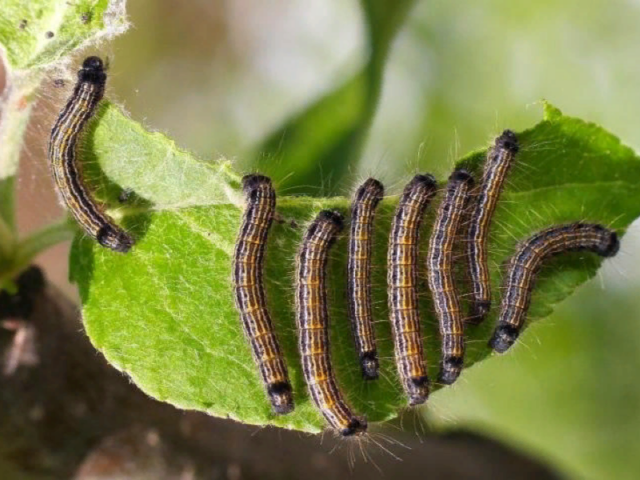
If there are a large number of pests, repeated treatment may be necessary.
Advantages and disadvantages
One of the main advantages of the Fastak pesticide is its enteric contact effect, that is, pests die both from the drug getting on the chitinous covers and from eating plants treated with the insecticide.

The chemical does not accumulate in fruits
Pros:
- fast action and high efficiency of the insecticide;
- wide range of beneficial effects;
- enteric contact action;
- cost-effectiveness and ease of use;
- does not reduce soil fertility;
- if safety rules are observed, the insecticide does not have a negative effect on the condition of plants and human health;
- low price.
Minuses:
- flammability and explosion hazard;
- the drug can evaporate quickly;
- relatively high level of toxicity;
- limited temperature regime of exposure (+10–23 ° C); at lower or higher air temperatures, the effectiveness of the insecticide noticeably decreases;
- insufficiently strong acaricidal effect (does not affect ticks);
- negative impact on pollinating insects.
Instructions for use of the drug Fastak
Treatment against pests is carried out by uniformly spraying the vegetative parts of plants with a working solution of the Fastak insecticide using a spray bottle or sprayer.
The consumption of the drug depends on the type of pest and the crop being treated and is 1-3 ml of emulsion per 10 liters of water.
To prepare the solution, Fastak emulsion is diluted with water according to the proportion specified in the instructions and stirred thoroughly until the emulsion is completely dissolved.
The period of active action of the insecticide lasts about seven days. The most effective treatment is carried out at an air temperature of +22–23 °C.
It is not recommended to spray plants on the eve of rain or immediately after it. In the first case, the drug will be washed off with water, as a result of which the treatment will be useless, and in the second, due to high air humidity, the effectiveness of the working solution will decrease significantly.
Fastak for apple trees
To treat apple trees and other fruit trees against leaf rollers, codling moths and flower beetles, prepare a solution at the rate of 3 ml per 10 liters of water. During the treatment process, not only the crown, but also the trunks are sprayed.
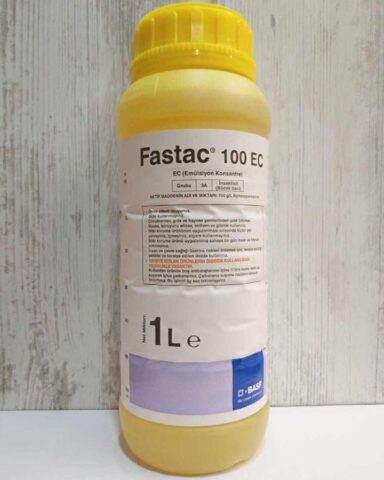
Treatment against pests with Fastak helps improve the quality of fruits
Fastak for tomato
Fastak also helps get rid of whiteflies on tomatoes. In this case, 1 ml of insecticide is diluted in a bucket of water. It is better to cultivate the beds in the evening hours, when the activity of the sun's rays decreases.

Fastak will help drive aphids away from tomatoes
Fastak for grapes
To destroy phylloxera and leaf rollers on grapes, the plant is sprayed with a working solution prepared at the rate of 3 ml of emulsion per 10 liters of water. The treatment is carried out on the leaves and vines.
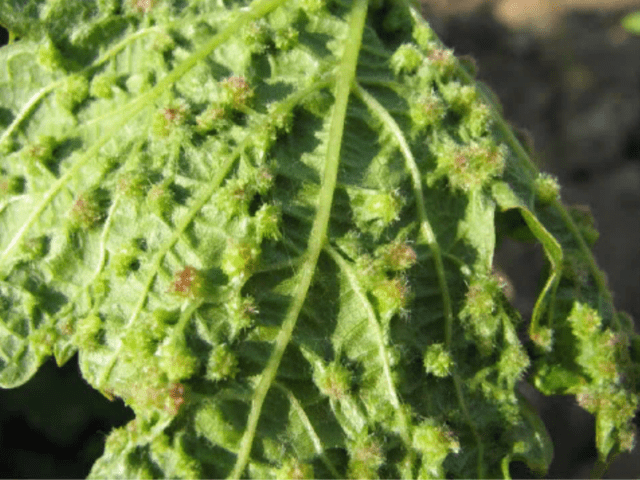
The invasion of phylloxera can cause the death of grapes
Fastak for potatoes
Fastak will also help save potatoes from the Colorado potato beetle. To do this, you need to spray the bushes with an insecticide solution (1 ml per 10 liters of water).

If you do not fight the beetle, it will quickly destroy a large area of plantings.
Other
Fastak is used to control pests on other plants:
- aphids, flea beetles, leeches, cicadas and thrips on vegetables, legumes and cereals - 1 ml of insecticide per 10 liters of water;
- aphids, flea beetles and weevils on beets - 2 ml per 10 liters of water;
- whitefly, moths, cruciferous flea beetles and cutworms on cabbage - 1 ml per 10 liters of water;
- locusts on lawn grasses – 3 ml per 10 liters of water;
- weevils on strawberries and ornamental plants – 2 ml per 10 liters of water;
Fastak emulsion from mole cricket is used according to the instructions for use (tubers, seeds, soil in the grooves are treated).After treating plants with the Fastak insecticide, the fruits may acquire a bitter taste. However, according to the results of studies, with the correct dosage of the pesticide, the concentration of harmful substances in fruits does not exceed the permissible limit and is absolutely harmless to humans.

Fastak will help restore the beauty of ornamental plants
Compatibility with other tools
Fastak is not compatible with chemicals that have an alkaline reaction. When combined with them, it will not cause harm to plants, but will lose a large share of its beneficial properties.
Safety precautions
Insecticide Fastak belongs to the second class of chemical hazards. If it comes into contact with mucous membranes or exposed areas of the body, it may cause irritation or burns. At the same time, the poison content in a properly prepared solution is so small that it cannot cause serious health problems.
However, to prevent troubles when working with Fastak, you should follow the following safety rules:
- Protect the skin and respiratory tract from insecticide particles. To do this, it is recommended to work in tight clothing that covers your arms and legs, gloves and a respirator.
- Avoid smoking and eating while working.
- Use the drug in strict accordance with the instructions for use.
- Spray plants in dry weather without wind.
- Do not work with pesticide for longer than four hours.
- After work, wash your hands thoroughly with soap and treat them with a disinfectant. Ideally, take a shower afterwards and wash your work clothes.
After spraying the plants with an insecticide, mechanical work on the site can be carried out no earlier than four days later, and manual work - after ten days.
The drug should be stored in sealed packaging in a cool, dry place. It is strictly not recommended to leave containers with emulsion or working solution near food, medicine and animal feed.
The shelf life of hermetically packaged emulsion is three years from the date of manufacture. It is advisable to use the working solution within 24 hours. Otherwise, the insecticide loses its properties.
Analogues of the drug Fastak
The chemical industry offers gardeners and gardeners a large number of insecticidal preparations with similar effects. Currently, the most popular analogues of Fastak are:
- for vegetables, as well as fruit trees and shrubs - Aktara, Decis. Lux, Actellik;
- for grain crops, beans and peas - Pirinex, Sumition, Super, Greenfort;
- for potatoes, tomatoes and eggplants – Spasatel, Inta-Vir, Bombardir, Calypso;
- for grapes - BI-58, Karate, Zolon.
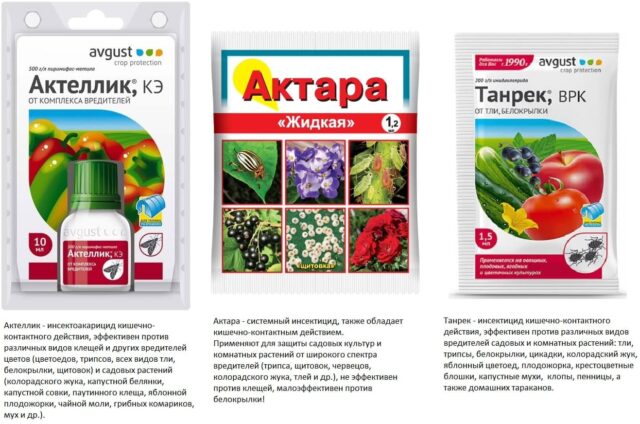
Some insecticides, like Fastak, have a wide spectrum of action and provide good results
Conclusion
Insecticide Fastak is an effective product that will help you quickly and efficiently clean your garden from pests. Correct dosage and compliance with safety rules will make the use of the drug safe for plants and humans.
